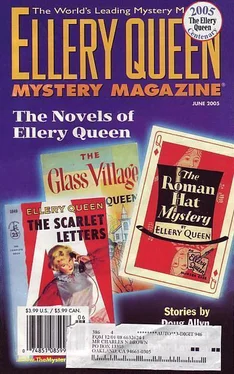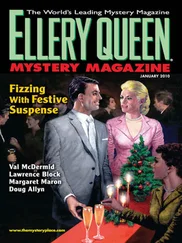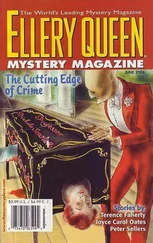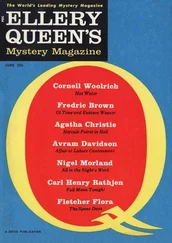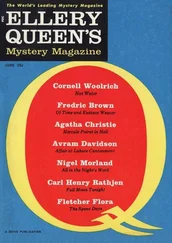Doug Allyn - Ellery Queen’s Mystery Magazine. Vol. 125, No. 6. Whole No. 766, June 2005
Здесь есть возможность читать онлайн «Doug Allyn - Ellery Queen’s Mystery Magazine. Vol. 125, No. 6. Whole No. 766, June 2005» весь текст электронной книги совершенно бесплатно (целиком полную версию без сокращений). В некоторых случаях можно слушать аудио, скачать через торрент в формате fb2 и присутствует краткое содержание. Город: New York, Год выпуска: 2005, ISBN: 2005, Издательство: Dell Magazines, Жанр: Детектив, на английском языке. Описание произведения, (предисловие) а так же отзывы посетителей доступны на портале библиотеки ЛибКат.
- Название:Ellery Queen’s Mystery Magazine. Vol. 125, No. 6. Whole No. 766, June 2005
- Автор:
- Издательство:Dell Magazines
- Жанр:
- Год:2005
- Город:New York
- ISBN:ISSN 1054-8122
- Рейтинг книги:3 / 5. Голосов: 1
-
Избранное:Добавить в избранное
- Отзывы:
-
Ваша оценка:
- 60
- 1
- 2
- 3
- 4
- 5
Ellery Queen’s Mystery Magazine. Vol. 125, No. 6. Whole No. 766, June 2005: краткое содержание, описание и аннотация
Предлагаем к чтению аннотацию, описание, краткое содержание или предисловие (зависит от того, что написал сам автор книги «Ellery Queen’s Mystery Magazine. Vol. 125, No. 6. Whole No. 766, June 2005»). Если вы не нашли необходимую информацию о книге — напишите в комментариях, мы постараемся отыскать её.
Ellery Queen’s Mystery Magazine. Vol. 125, No. 6. Whole No. 766, June 2005 — читать онлайн бесплатно полную книгу (весь текст) целиком
Ниже представлен текст книги, разбитый по страницам. Система сохранения места последней прочитанной страницы, позволяет с удобством читать онлайн бесплатно книгу «Ellery Queen’s Mystery Magazine. Vol. 125, No. 6. Whole No. 766, June 2005», без необходимости каждый раз заново искать на чём Вы остановились. Поставьте закладку, и сможете в любой момент перейти на страницу, на которой закончили чтение.
Интервал:
Закладка:
“Let it be, Danny. It’s his house.”
“But he’s letting it burn!”
“What else can he do? Couldn’t live there or give it back to the town. It’s better this way. Finally over and done with.”
“Maybe you’re right. But that’s one hell of an expensive gesture. And it’s a damn shame.”
Far below, Beau Raven stood like a stone, watching his dream burn down to the waterline. A few townspeople gathered but kept a wary distance. No one tried to stop him.
As if answering the madness in the village, the northern gale unleashed its fury over the bay. Storm winds howled out of hills and across the ice, snow devils spinning wildly ahead, keening like a pack of ghost wolves.
The rising storm whipped the blazing fish house into an inferno. Sparks and cinders hurtling upward in a pillar of smoke, towering high above the bay.
Writhing and swirling in the wind.
Like a Wolf Woman.
Dancing.
Copyright © 2005 by Doug Allyn.
The Barber’s Toe
by Edward D. Hoch
Alexander Swift, Revolutionary War spy and amateur sleuth, is one of Edward D. Hoch’s newer series characters, having debuted in EQMM in September ’95 ( “The Hudson Chain” ). The war over, Swift continues to hobnob with the celebrities of the age in this 1796 adventure featuring Washington and Adams. The incident with the barber’s toe, Mr. Hoch says, “is mentioned by John Adams in his diaries.”
It was with a certain sadness that Alexander Swift called upon President Washington for possibly the last time in September of 1796. He’d seen little of the President in recent months, and Washington’s decision not to seek a third term had set off a flurry of activity among both the Federalists and the Democratic-Republicans.
“It is a delight to see you again, Alex,” the President said, greeting him with a firm handshake in the presidential office in Philadelphia. The date was September nineteenth, and he was about to depart for a few weeks at Mount Vernon. “How are Molly and young George?”
“Fine, sir, both of them. I was greatly moved by your Farewell Address in this morning’s newspaper, though I’m sorry to learn of your decision not to seek a third term. Now you will never reside in the new presidential mansion in the District of Columbia.”
Washington smiled sadly. “I leave that honor to my successor. Our new nation does not need another monarchy. Two terms are enough. Adams and Jefferson can battle it out.”
“I understand that John Adams has not been happy in his role as your Vice President.”
“He has complained to his wife Abigail that it is the most insignificant office man ever conceived, and I suppose there is some truth to that. But our nation is still young. I trust that in future generations the office will become more meaningful. Adams has another problem right now. As I understand it, someone from his past has threatened his life. He is quite concerned, and we have no official means of protecting him. I suggested you might be able to help.”
“Of course,” Alex said at once. “I’ll do what I can.”
“It would only be temporary. I suspect the threat will pass after the election.”
“You can’t think Jefferson’s people are behind this.”
Washington shook his head. “No, no — of course not. This is something far in the past. It is a bizarre story, but it is best you hear it from him.”
A meeting had been arranged with Adams for the following day. The Vice President was a small man, especially when compared to President Washington, and he had a small office. His round face was set off by tufts of gray hair on either side of a balding head. More a philosopher than a politician, Adams was known to have resented Jefferson’s drafting of the Declaration of Independence, a document he felt had taken much from his own Boston Declaration of Rights in 1772.
“How is your campaign going?” Alex asked after they exchanged pleasantries.
“It is just getting started, but I fear the Federalists are losing power, at least in New York. Jefferson’s Democratic-Republicans are gaining on us. It will be a very close vote.” He seemed a bit weary as he spoke, looking all of his sixty years. “Since presidential candidates do not run for office with vice presidential candidates of their own choosing, it is possible that Jefferson and I might have to take office together as President and Vice President — if we are the two top vote-getters. But whoever wins, the country must come to grips with the increased naval threat from France and Britain. I feel we should avoid war with France at all costs.”
“President Washington said you were having a problem.”
“Yes, yes. A minor thing,” he said, dismissing it with a wave of his hand. “But he felt you might be of service to me. This all happened eighteen years ago, in March of seventeen seventy-eight, when I was aboard the frigate Boston, en route to France on a diplomatic mission for the Continental Congress. It was a long, rough voyage and I was seasick part of the time. We encountered and captured a British warship and had run-ins with the French as well. We had on board a French barber whose name I have forgotten, if I ever knew it. During one skirmish off the coast of Spain he tried to go below deck, contrary to orders. He scuffled with a sentinel and the man cut off the barber’s left big toe with his cutlass. For a brief time, there was ill will with the other Frenchmen on board, but we managed to calm them.”
“How has this event come back to trouble you?”
“The barber, apparently a man named Pierre Facon, is living in New York. Last week, after rumors of Washington’s impending retirement began to circulate and I let my candidacy be known, I received this threatening message. It was hand-delivered to my office by a street urchin.”
Alex took the message and read it. The handwriting was crabbed, difficult to decipher, and seemed to be in a combination of French and English. The writer accused Adams of having ordered the sentinel to cut off his toe, causing him to go through life with a painful limp. He ended the message with a promise of vengeance unless he was paid an unspecified sum of money.
“The maiming happened during a scuffle,” Adams insisted. “It was not deliberate.”
“In any event, why would he blame you, a mere passenger on the ship? It was not as if you were under arms.”
“It is a fact that I was carrying a musket at the time. I sometimes aided our forces by firing at enemy ships during an engagement. This barber may have objected to my actions. It is difficult to remember after so many years.”
Alex turned over the message, seeking an address. There seemed to be none, although the letter had been written on the back of a handbill for a boardinghouse on New York’s Greenwich Street. He knew the city well, having lived there with his first wife at the start of the Revolution. “I could go to New York if you wish, and try to find this fellow.”
“It would put me deeply in your debt if you could remove this threat. With the election looming, Abigail is already concerned for my safety. Offer the man money if he is in need of it.”
“I know it was eighteen years ago, but do you have any recollection of this Pierre Facon’s appearance?”
“A tall man, as I remember. Taller than me, at least. He’d be middle-aged by now. I hadn’t thought of him in years, didn’t even remember his name.”
“I doubt if you’re in any real danger,” Alex told the Vice President. “But I will attempt to find this French barber and deal with him.”
Adams seemed alarmed at his words. “I don’t want the poor man harmed.”
Alex laughed. “I am not a violent man, sir, as I’m sure the President has told you. During the war it was something else, but now I prefer peaceful resolutions to problems wherever possible.”
Читать дальшеИнтервал:
Закладка:
Похожие книги на «Ellery Queen’s Mystery Magazine. Vol. 125, No. 6. Whole No. 766, June 2005»
Представляем Вашему вниманию похожие книги на «Ellery Queen’s Mystery Magazine. Vol. 125, No. 6. Whole No. 766, June 2005» списком для выбора. Мы отобрали схожую по названию и смыслу литературу в надежде предоставить читателям больше вариантов отыскать новые, интересные, ещё непрочитанные произведения.
Обсуждение, отзывы о книге «Ellery Queen’s Mystery Magazine. Vol. 125, No. 6. Whole No. 766, June 2005» и просто собственные мнения читателей. Оставьте ваши комментарии, напишите, что Вы думаете о произведении, его смысле или главных героях. Укажите что конкретно понравилось, а что нет, и почему Вы так считаете.
